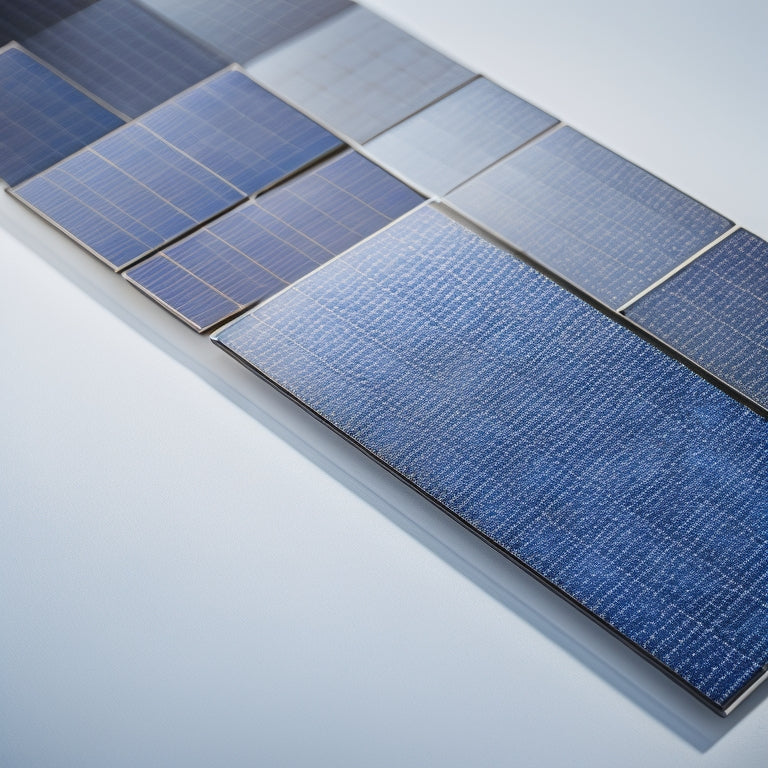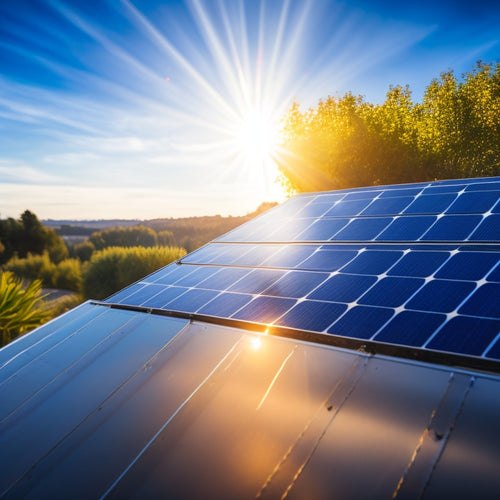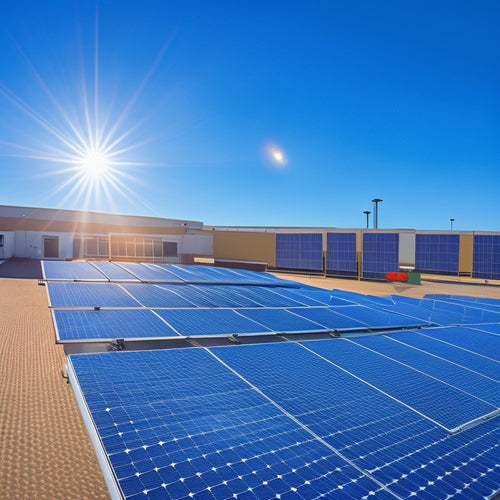
Small Solar Panels for Sale
Share
When shopping for small solar panels for sale, you're likely looking for portable, efficient, and reliable options that offer energy independence and self-sufficient living. Compact designs weighing as little as a few pounds facilitate easy storage and transport, making them ideal for outdoor enthusiasts and remote dwellers. High-efficiency monocrystalline cells guarantee maximum power output, while peak sun hours and energy production vary depending on panel size and positioning. With wattage options ranging from 50W to 300W, you can choose the perfect fit for your needs. As you investigate your options, you'll uncover the key features and considerations that will help you make an informed decision.
The Essentials
- Small solar panels offer portability and compact designs, weighing as little as a few pounds, for easy storage and transport.
- High-efficiency cells and weather-resistant coatings ensure durability and performance in outdoor settings, providing reliable power for devices.
- Compact solar panels optimize space, allowing for better storage and transport, and are ideal for outdoor enthusiasts and remote dwellers.
- Renewable energy sources reduce reliance on finite fossil fuels and price volatility, contributing to lower energy bills and carbon footprints.
- Small solar panels promote energy independence and self-sufficient living, reducing dependence on the grid and enhancing overall energy independence.
Portability in Small Sizes
When you're on the go, you need lightweight power options that won't burden you. That's why small solar panels are designed to be ultra-portable, with some models tipping the scales at as little as a few pounds.
Many outdoor enthusiasts and remote dwellers are turning to renewable energy solutions to power their escapades and daily lives. A compact design matters, as it allows you to easily stash your solar panel in a backpack or attach it to a trailer, giving you the freedom to generate power wherever you need it.
Lightweight Power Options
As you journey into the great outdoors or commence a remote project, compact power sources become essential, and small solar panels fit the bill. You need lightweight power options that can keep up with your escapades, and small solar panels provide the perfect solution.
They're designed to be portable, allowing you to utilize the sun's energy wherever you go. With portable solar chargers, such as foldable solar mats, you can eliminate the risk of dead batteries while camping or hiking by providing a reliable source of power Renewable energy solutions. They're ideal for charging small devices, such as smartphones, laptops, and cameras, ensuring you stay connected and productive in the field.
When choosing a small solar panel, consider the weight, size, and power output. Look for panels with high-efficiency cells, durable construction, and weather-resistant coatings.
With the right small solar panel, you can enjoy the great outdoors or work remotely without worrying about power outages. You'll have the freedom to roam, create, and connect, no matter where your escapades take you.
Compact Design Matters
You're looking for a power solution that's not only lightweight but also compact, allowing you to easily stow it away in your backpack or carry it in your hand. This is where compact design matters. A compact solar panel offers more than just portability; it provides space optimization, allowing you to make the most of your available space.
With a compact design, you can fit more power into a smaller area, making it ideal for outdoor enthusiasts, travelers, and anyone who needs reliable energy on-the-go. By incorporating portable renewable systems into your setup, you can enjoy the benefits of solar power without sacrificing convenience. Moreover, compact solar panels are perfect for remote professionals who require a reliable source of energy to stay connected and productive.
The compact benefits of small solar panels extend beyond just physical space. They also enable you to be more flexible and adaptable in your power generation. You can easily move your solar panel to track the sun's movement, maximizing energy output.
Additionally, compact solar panels are often designed with durability in mind, making them more resistant to the elements and rough handling. When you're relying on your solar panel for power, you need it to be reliable and efficient. Compact design guarantees that you get the most out of your solar panel, without sacrificing performance or convenience.
Increased Energy Independence
When you invest in small solar panels, you're taking a significant step towards relying on renewable energy sources, reducing your dependence on the grid and minimizing your carbon footprint.
By utilizing sunlight to power your devices, you'll experience a sense of self-sufficient living, where you're in control of your energy needs.
With residential solar power systems, you can generate renewable energy and save on electricity bills.
This not only helps the environment but also increases your energy efficiency.
This increased energy independence will also shield you from fluctuating energy prices and potential power outages.
Renewable Energy Sources
Utilizing renewable energy sources is essential in achieving increased energy independence, as it reduces reliance on finite fossil fuels and mitigates the impact of price volatility. You're likely aware that fossil fuels are finite, and their prices can fluctuate wildly, affecting your energy costs and stability.
By investing in renewable energy sources, you're taking a significant step towards breaking free from this unpredictability.
You can capitalize on solar panel benefits, such as reduced energy bills and a lower carbon footprint, by integrating them into your energy strategy. Renewable energy trends indicate a shift towards decentralized energy production, allowing individuals like you to generate their own power.
This decentralized approach enables you to take control of your energy needs, reducing your reliance on the grid and enhancing your energy independence. As you investigate small solar panels for sale, consider the long-term benefits of renewable energy sources and how they can contribute to your increased energy independence.
Self-Sufficient Living
Embracing self-sufficient living means taking control of your energy needs, and small solar panels for sale can be an essential step in this path. By adopting sustainable lifestyle practices, you're not only reducing your reliance on the grid but also contributing to a cleaner environment through eco-friendly practices. Energy conservation is a critical aspect of self-sufficient living, and small solar panels can help you achieve this goal.
| Benefits of Self-Sufficient Living | Ways to Achieve It |
|---|---|
| Energy Independence | Off-grid living with solar power |
| Reduced Carbon Footprint | Homesteading techniques, green technology |
| Increased Resource Management | Minimalist living, eco-friendly practices |
When you choose to live off the grid, you're taking control of your energy needs and reducing your reliance on public utilities. By incorporating small solar panels into your homesteading techniques, you're not only generating clean energy but also reducing your carbon footprint. By adopting a minimalist lifestyle and embracing eco-friendly practices, you're taking a significant step towards achieving energy independence and living a self-sufficient life.
High-Efficiency Monocrystalline Cells
You'll want to pay close attention to the cell efficiency ratings of high-efficiency monocrystalline cells, as they directly impact the maximum power output of your small solar panel.
In fact, high-performance panels can considerably boost your home's energy and maximize energy savings.
These ratings typically range from 15% to 22%, with higher efficiencies translating to more power output per unit area.
Cell Efficiency Ratings
When it comes to small solar panels, high-efficiency monocrystalline cells are a top choice for maximizing energy output. One key factor in their performance is cell efficiency ratings. You'll want to understand how these ratings impact your solar panel's overall cell performance.
Efficiency ratings measure how well a cell converts sunlight into electricity. Higher ratings indicate better performance. For monocrystalline cells, you can expect efficiency ratings between 18% and 22%. In an efficiency comparison, these cells outperform polycrystalline cells, which typically range from 15% to 18%.
The higher efficiency translates to more power per unit area, making them suitable for small solar panels where space is limited.
When evaluating cell efficiency ratings, you'll notice that manufacturers often provide a rating under standard test conditions (STC). These conditions simulate ideal sunlight and temperature. Real-world conditions may vary, but STC ratings provide a standardized basis for comparison.
Maximum Power Output
High-efficiency monocrystalline cells' superior performance is further demonstrated by their maximum power output. You'll benefit from their ability to generate more power per hour of sunlight. This increased energy conversion is due to their maximum efficiency, which is considerably higher than that of other solar cells.
When choosing small solar panels, you should consider the maximum power output to guarantee you're getting the most energy from your investment. Here's a comparison of high-efficiency monocrystalline cells:
| Cell Type | Maximum Power Output (W) | Maximum Efficiency (%) | Energy Conversion (Wh/m²) |
|---|---|---|---|
| High-Efficiency Monocrystalline | 350 | 22.5 | 250 |
| Standard Monocrystalline | 250 | 18.5 | 180 |
| Polycrystalline | 200 | 15.5 | 140 |
| Thin-Film | 150 | 12.5 | 100 |
As you can see, high-efficiency monocrystalline cells offer the highest maximum power output and maximum efficiency, resulting in more energy conversion per hour of sunlight. This means you'll get more power from a smaller panel, giving you the freedom to power your devices and systems with confidence.
Check Wattage Per Hour
You need to evaluate two key factors when checking wattage per hour: daily energy output and peak sun hours.
When it comes to utilizing solar energy for your home, it's crucial to reflect on residential solar energy and how it can impact your overall energy output.
Additionally, pairing your solar panels with a reliable battery backup system can guarantee a steady supply of energy even during periods of low sunlight.
Daily energy output refers to the total amount of energy your solar panel produces in a day, typically measured in watt-hours (Wh).
Peak sun hours, on the other hand, represent the amount of energy your solar panel can produce under ideal sunlight conditions, usually measured in hours.
Daily Energy Output
Determining the daily energy output of small solar panels involves calculating the wattage per hour, which depends on several factors, including the panel's efficiency, size, and the amount of sunlight it receives. To get an accurate estimate, you'll need to take into account your daily energy consumption and how it relates to the panel's output.
| Panel Size (Watts) | Daily Energy Output (Wh) |
|---|---|
| 50W | 200-300 Wh |
| 100W | 400-600 Wh |
| 200W | 800-1200 Wh |
| 300W | 1200-1800 Wh |
When placing your solar panel, keep in mind that the amount of sunlight it receives will greatly impact its daily energy output. A well-placed panel can generate up to 5 hours of peak sunlight, resulting in higher energy output. Conversely, a panel placed in a shaded area will produce less energy. By understanding your daily energy consumption and optimizing your solar panel placement, you can maximize your energy output and enjoy the freedom of renewable energy.
Peak Sun Hours
Peak sun hours greatly impact the daily energy output of small solar panels. As you consider purchasing small solar panels, it's crucial to understand the concept of peak sun hours.
Peak sun hours refer to the amount of solar radiation your solar panel receives in a day, usually measured in watt-hours per square meter (Wh/m²). The more peak sun hours your solar panel is exposed to, the more energy it will produce.
To maximize energy output, you need to verify ideal positioning of your solar panel. This means placing it at an angle that receives the most direct sunlight throughout the day.
In regions with high peak sun hours, your solar panel will produce more energy, even with a smaller surface area. Conversely, in areas with low peak sun hours, you may need a larger solar panel to achieve the same energy output.
When checking wattage per hour, consider the peak sun hours in your area. This will help you determine the perfect solar panel size and configuration for your energy needs.
Lighter Than Traditional Panels
You'll find that small solar panels weigh less overall, making them ideal for installations where weight is a concern, such as RVs or boats.
This reduced weight also translates to easier handling and installation, reducing labor costs and time.
With a lower overall weight, you can enjoy the benefits of solar power without the hassle of heavy, traditional panels.
Weighs Less Overall
The compact design of small solar panels translates to a markedly lighter overall weight, making them a more convenient option compared to traditional panels.
You'll appreciate the reduced weight when it comes to installation, as it requires less effort and resources. This, in turn, leads to installation ease, which is especially important when working with limited roof space or unique structural designs.
The lighter weight also has implications for energy storage. With smaller panels, you'll need less structural support, reducing the overall weight of your energy system.
This means you can allocate more resources to energy storage, allowing you to capture and store more power from the sun. As a result, you'll enjoy greater energy independence and freedom from reliance on the grid.
When considering small solar panels for sale, keep in mind that their lighter weight is a significant advantage.
It not only simplifies the installation process but also enables more efficient energy storage, ultimately giving you more control over your energy needs.
Frequently Asked Questions
Are Small Solar Panels Compatible With Existing Electrical Systems?
When you're considering solar power, you'll find that small panels are compatible with existing electrical systems, but you'll need to assess installation requirements and optimize energy efficiency to guarantee seamless integration and maximum freedom from the grid.
Can I Install Small Solar Panels Myself or Need Professional Help?
You're not alone in considering DIY solar installation - 70% of homeowners attempt it. However, be aware that safety concerns arise when handling high-voltage systems; it's essential to weigh your technical knowledge against the risks before deciding to go solo or seek professional help.
How Long Do Small Solar Panels Last in Harsh Weather Conditions?
You'll find that modern solar panels boast impressive durability, with weather-resistant materials ensuring they can withstand harsh conditions, such as heavy rain, hail, and extreme temperatures, for 25 years or more, providing you with reliable, long-term energy independence.
Are Small Solar Panels More Expensive Than Traditional Panels?
When you're building a dream home, every dollar counts; similarly, when choosing solar panels, cost comparison is key. While small solar panels may have lower efficiency ratings, they're often competitively priced, making them a viable option for those seeking energy independence.
Can I Use Small Solar Panels to Charge My Electric Vehicle?
You can charge your electric vehicle using small solar panels, but consider the charging capacity you need and strategic installation locations to maximize energy harvesting, ensuring a convenient and sustainable fueling experience on the go.
Final Thoughts
As you utilize the sun's power with small solar panels, imagine liberating yourself from the grid's heavy chains. These compact marvels are the keys to securing energy independence, much like a traveler shedding excess baggage to roam freely. With high-efficiency monocrystalline cells and precise wattage control, you'll traverse the path to sustainability with ease. And, just as a feather is lighter than a boulder, these panels' reduced weight makes them the perfect companion for your eco-friendly expedition.
Related Posts
-

How Efficient Are Thin Film Solar Cells
Thin film solar cells provide an innovative approach to energy generation, boasting efficiency rates generally betwee...
-

Essential Solar Panel Mounts for Commercial Properties
When it comes to essential solar panel mounts for your commercial property, durability and wind resistance are key fa...
-

Top Solar Powered Camping Fans for Camping Enthusiasts
If you're a camping enthusiast, a solar-powered fan can be a transformative element for your outdoor experience. Thes...


